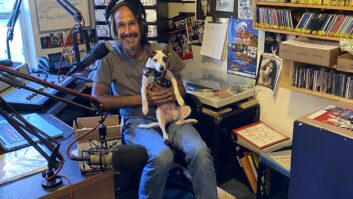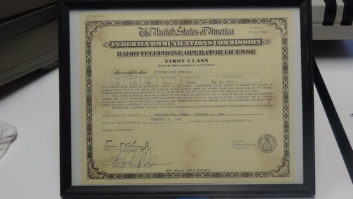
I called it “revolving door radio.”
With 12 station managers in eight years, our small-town AM kicker enjoyed a diverse form of management styles and personnel in the 1950s and ’60s — not to mention an eyebrow-raising reputation with the hesitant business community.
Fortunately, most of the time our programming remained consistent, although Frank Sinatra and Glenn Miller might be followed by blocks of country and western music, then Spanish, symphony music, rock-and-roll and “only God knows what.”
It was fun for most, ulcer-causing to some and downright pathetic to others.
We had more managers than Baskin-Robbins had ice cream flavors. Our managers came in all sizes, shapes and ages.
One short-timer could have inspirited Gordon Jump’s role as station manager in the TV series “WKRP in Cincinnati.” This man floated into his office about 10 each morning mumbling “Hellos,” cowered behind his desk and didn’t emerge from his sanctum sanctorum until 4:30 p.m., muttering “Good-byes.” I never saw him make a sales call.
He lasted until the station owner asked for the first month’s billing.
Our old RCA barn-door size transmitter belched enough power to cover our county and edged into adjoining counties. The owner, who lurked in a major city a hundred miles away and beyond our signal, was a lawyer who’d built the station shortly after World War II. He’d briefly managed it until he alienated advertisers by suing any who were more than five minutes late in paying their bills.
Farm radio
A stream of bosses washed through the station’s small building on the edge of town. The towers blinked within a few hundred feet of our small flat-roofed structure. A parking lot provided gritty dust. We were surrounded by farmland that usually was devoted to lima beans.
It was a challenge to shout through a 15-minute, wire-generated newscast while competing with the deafening roar of a Star Wars-sized harvester threshing beans within two feet of the control room window. The VU meter slammed into the “red” as the behemoth slowly drove by, kicking up enough dust to hide Mt. Rushmore.
The driver would smile and wave. I’m sure he patiently waited with portable radio behind the building to make sure my microphone was open before proceeding.
One manager, a short fellow, tried turning our station into a whiz-bang moneymaker by doing what he called “family radio,” a format none of us could understand. He soon was vaporized.
The other station in town ran more financial rings around us than you’d find in a cheap motel’s bathtub. Their announcers also sold radio time. Our dollar-a-holler sales personnel usually were too busy seeking jobs, especially when a new head man with shiny pants announced he would triple our rate card because he’d heard it was the way to tripled station billing. The ink hadn’t dried on his business cards before he was history. Our staff always had to pick up the pieces and survive.
In the early 1950s, when a competitor called television was emerging, critics claimed no one would ever again “listen to radio.” It took years to prove them wrong.
Our front door was in constant motion, a combination spinning top and whirling dervish, as managers came and fled. Doses of WD-40 kept the door from squeaking.
Most helm-masters didn’t say good-bye, they just departed.
For a time we had a husband-and-wife team, Mike and Marge. They did a good job until they clashed with the owner, a perennial problem for anyone in the catbird seat.
Another time an out-of-state salesman accepted a job offer from one of our spinning managers. However, by the time he arrived with family and furniture, our latest leader was gone, replaced by a new one, who asked: “Who’s this?” Fortunately he kept the salesman.
Good-timing Phil
Then there was Phil, a married man who juggled management and sales while pursuing women like an Olympic sport.
He was a big man who drove bright-colored convertibles. He lasted longer than other managers. He was gruff and sometimes difficult. But I liked the guy. We had some good times together.
Station income and programming improved under his leadership. He added first-time mobile units for live field reporting. Frequent promotions included record-busting stay-awake DJ marathon broadcasts from downtown store windows and a live broadcast of the wedding of our popular nighttime rock-and-roll DJ.
But like his predecessors, he’d hand us our paychecks days late, saying: “See if you can cash this out of town.” If I got to the bank first and the check cleared, my wife, baby and cocker spaniel ate until next payday.
Phil’s zipper should have been welded shut. He had a lovely wife but was constantly involved with pickups — not trucks with beds, but saloon pickups he was trying to bed; he had more pickups than a Ford dealership.
Phil frequently brought barroom beauties by the station late at night to show them what a “real radio station looked like.” A tour of our mouse-small building usually took under 10 seconds. It had been the remote transmitter site before our downtown studio-offices were shuttered; personnel and studios were shoehorned into the cramped jerry-rigged building alongside our transmitter.
I never could understand why Phil’s wife Beryl stayed with him — especially after he placed his steady girlfriend, Kerri, in the front office, where the two women worked within feet of each other, exchanging eye-daggers and occasional Neanderthal grunts.
And they knew Phil was two-timing them both.
The Olympic gold medal event in Phil’s lovemaking came when he drove into the radio station late one night with his latest barroom catch. While giving the blonde the 25-cent tour, Kerri unexpectedly arrived.
Phil hustled his peroxide bimbo into the women’s rest room and whispered, “Keep the light off and your mouth shut. I’ll get rid of Kerri and we can get the hell out of here.” Then he started sweet-talking Kerri, promising he’d be “right home” to her apartment, when Beryl showed.
Phil now moved from sweating H2O to blood. He hustled Kerri into a dark corner of our unlit Studio B, opposite the control room, feet from the unseen bathroom cutie. I’m sure he also said: “Keep the light off and your mouth shut. I’ll get rid of my wife and we can get the hell out of here.”
He was a super salesman, with the charm of a funeral director conducting a $100,000 wake. “I’ll be right home, honey,” he said, sweet-talking his wife and smiling like a politician with both hands in your pockets.
His wife left.
Phil then waltzed Kerri out of Studio B and repeated: “I’ll be right home, honey.”
And she left.
He then grabbed his rest-room blonde and hurried to the nearest motel, where we probably had a trade deal.
Our night announcer witnessed it all. Had the NAB issued awards for acting, Phil would have had a trunk full. Further details of this love triangle are reserved for a book I may write.
We had a secretary who came to work sober but would be drunk by quitting time. She wasn’t drinking at her desk; but we eventually found her half-pint bottle stashed behind the toilet tank in the same women’s restroom. If Phil’s bimbo had found it, it would have made a more interesting story.
I’m not sure how I survived the constant march of managers and formats, but I was young, and worked cheap as an announcer. I was the last of the original employees after about eight years. Had I been on the sinking Titanic, I probably would have chipped ice from the deadly iceberg, mixed it with tequila and lime juice, poured it into salt-rimmed glasses and sold margaritas to my fellow lifeboat survivors.
Are you on the air?
The station sold and I moved to a different radio market.
One day the station owner bought a new fire extinguisher and said she would keep it locked up in the storage room. “What happens if we have a fire in the control room?” I asked.
“Then you come and get the key from me,” she explained. “Then you unlock the storage room, and get the fire extinguisher.”
“And what happens if we have a fire, and you’re not here?”
The next day the extinguisher was mounted on our control-room wall.
She often interrupted me while I was on the air talking into a “hot” microphone. It drove me crazy. I finally went to her husband to see if he could stop her. He tried. It didn’t work.
Days later she took me behind closed doors and informed me it was her radio station and she’d run it her way.
“Okay,” I sighed, remembering the golden rule between owner and employee: The person with the gold makes the rules.
The next time she entered the control room and began talking while I was reading a newscast, I closed my mic and gave her my undivided attention. We had dead air for several minutes before she finally stopped talking and asked:
“Are you on the air?”
“Yes,” I quietly replied. “I’m reading the news.”
“Oh,” she said. “I’ll talk to you later.”
Unfazed, she left, and I finished my newscast.
No actual names were used in this story. Big Jim Williams is the author of audio books including “The Old West” and “Tall Tales of the Old West.” His 2007 RW article about re-creating baseball games can be foundhere. A lifelong broadcaster, he welcomes emails at[email protected].












